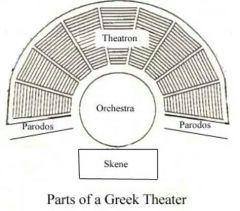![]()
![]()
![]()
Use LEFT and RIGHT arrow keys to navigate between flashcards;
Use UP and DOWN arrow keys to flip the card;
H to show hint;
A reads text to speech;
35 Cards in this Set
- Front
- Back
|
Skene |
A building or backdrop that stands behind the stage, would later have been painted and would house the changing area |
|
|
Proskenion |
In front of the skene where the three principle actors performed |
|
|
Parados (theatre) |
Side entrances. Entered through the skene if from inside the palace, via the Parados if coming from elsewhere. |
|
|
Ekkyklema |
Wheeled section of staging- often brought through the skene so that scenes could be set inside the building or elsewhere. |
|
|
Orchestra |
Large circular or semi circular area in front of the stage for the chorus |
|
|
Seating/theatron |
To begin with this was just a hill, then wooden seats, then stone was built directly into hill (this still stands now in athens) |
|
|
The performance |
Three actors played all parts. So phones was first to use three actors. E.g. In antigone; one played creon, one played antigone, haemon and messenger and one played Ismene, soldier, teirisias and eurydice. Chorus of many in orchestra, could be guards, non-speaking roles if needed but all spoke/sang together as chorus. Use of masks and costumes is very important. |
|
|
Tragedy |
A very specific genre. Central character suffers a serious misfortune directly linked to their actions, but often assisted by fate. Making the point that suffering is brought on by a combination of human and divine actions. |
|
|
Prologue |
Opening scene of play |
|
|
Parados (play) |
Opening choral ode |
|
|
Stasimon |
Other choral odes, alternating with episodes of action. |
|
|
Kommos |
A lyrical song of lamentation that the chorus and a dramatic character sing together, occurring when the tension of the play rises to a climax of grief or horror or joy. |
|
|
Hyporchema |
Joyful choral ode sung to worship the gods, specifically dionysus- usually sung as the final choral ode before the exodus when the final tragedy is discovered. |
|
|
Exodus |
Final scene of play |
|
|
Hamartia |
Tragic error or flaw, usually fatal |
|
|
Peripeteia |
Turning point, reversal of Fortune- usually from good to bad in tragedy |
|
|
Anagnorisis |
Moment of critical discovery |
|
|
Hubris |
Extreme arrogance or pride, particularly defiance of the gods |
|
|
Stichomythia |
Debate between two characters, usually line by line |
|
|
Choryphaeus |
Chorus leader, often the one who converses with actors |
|
|
Strophe and antistrophe |
Section in choral odes, spoken by different halves of chorus, sometimes in opposition to another |
|
|
Prologue |
-Antigone and ismene meet to discuss burying polyneices. -Antigone wants to bury the body despite the decree as it is the will of the gods but ismene is too scared. |
|
|
Parados (play) |
The chorus (senators of thebes) describe the war that thebes has just won. -They tell us that polyneices and eteocles (the brothers) have killed each other in battle and that creon is now king. |
|
|
Episode 1 |
-creon gives his decree. Eteocles (on the side of thebes) is to be buried but polyneices (the enemy) is to he left unburied. -anyone who buries the body will be stoned to death. -soldier enters and says the body has been buried. |
|
|
Stasimon 1 |
-ode to man -man is powerful and has tamed nature, curing all but death. - with great power comes great responsibility. |
|
|
Episode 2 |
-soldier returns with guilty Antigone -Antigone admits guilt and is proud. -creon also summons is mine, who he assumes is guilty and sentences them both to death. |
|
|
Stasimon 2 |
-ode to the gods. -For all man's power he is nothing compared to the power of the gods. |
|
|
Episode 3 |
-haemon speaks to creon about his decision. -He says the people think he is wrong and that he should do the right thing. -They argue and haemon says there will be two death not one. . |
|
|
Stasimon 3 |
-ode to love -love is powerful and makes people do things they wouldn't do without it. |
|
|
Episode 4 |
-antigone discusses the unfairness of her sentence with the chorus (kommas) -she stands by her decision but doesn't think she should die for it. -creon enters and sends her to be locked in a cave. |
|
|
Stasimon 4 |
-chorus describe three stories from Greek mythology where people had a similar fate ti Antigone based on a curse from the gods. |
|
|
Episode 5 |
-Teiresias (the blinds seer) tells creon that the gods are angry. -He has gone against the laws of the God and must Bury polyneices and release Antigone. -creon refuses but realises his mistake once he has gone. |
|
|
Stasimon 5 |
-hyporchema -joyus worship of dionysus. |
|
|
Exodus |
-messenger enters and tells the chorus and eurydice of the deaths of Antigone and Haemon as creon was too late -creon returns distraught to hear the news that eurydice is also dead. he acknowledges his mistakes. |
|
|
Greek theatre |

|

